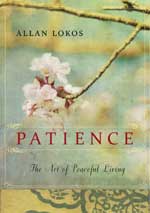This post contains audio, video, or images. View media now
During the month of February, we’re reading Allan Lokos’s Patience: The Art of Peaceful Living at the Tricycle Book Club. Pick up a copy and join the discussion here. Below is an excerpt from the book.
 “One day, Ananda, who had been deep in thought for a while, addressed the Buddha saying, ‘I’ve been thinking, spiritual friendship seems at least half of the spiritual life.’ The Buddha replied, ‘Not so, Ananda, not so. Spiritual friendship comprises the entire spiritual life.’”
“One day, Ananda, who had been deep in thought for a while, addressed the Buddha saying, ‘I’ve been thinking, spiritual friendship seems at least half of the spiritual life.’ The Buddha replied, ‘Not so, Ananda, not so. Spiritual friendship comprises the entire spiritual life.’”
—Buddha, Samyutta Nikaya 3:18
Every moment of our lives is spent in relationship with someone or something and every relationship has the potential to bring both joy and sorrow. We are always in a relationship with self, which becomes abundantly clear when we spend quiet time with ourselves such as in meditation. There we can see whether we treat ourselves honorably with kindness and compassion or are overly self-critical and easily annoyed. Are we patient with ourselves? If not, can we really expect to be kind and patient with others? This type of self-examination is essential if we want to bring greater joy and reverence to our relationships.
Although the boss or the noisy neighbor can try our patience, it is our relationships with those we care about most that can, at times, present the most challenging issues, undoubtedly for the very reason that these are the relationships that matter most to us. This is where we are emotionally most heavily invested. Our long history with a parent, brother, sister, or other relative can be laden with offenses and misunderstandings. Our relationship with a significant other can be easily stressed as together we maneuver the choppy waters of the ocean of our days.
If we want others to listen to our views, we must be willing to listen to theirs. Quickly formed opinions may be hindrances to patience. We can become so convinced of the validity of our views that we can’t hear those of the other. You can be sure that will try the patience of others just as it would yours. Watch carefully what goes on in your mind as you listen to views that are different from your own. Those thoughts and feelings may also be detected as sensations in the body. Become familiar with those sensations. They might be indicating reactive or conditioned responses or a lack of openness to the views of others. In the quiet of meditation we have an excellent opportunity to observe the relationship between thoughts and feelings and their subsequent physical sensations.
The Brahma Viharas: kindness, compassion, joy, and equanimity, can be the building blocks for inner peace and meaningful relationships. With patience we can develop deeper levels of these virtuous qualities.
Have something to say? Join the discussion here.
Below is an animated trailer for Patience: The Art of Peaceful Living, following which are a number of video teachings by Lokos.
Thank you for subscribing to Tricycle! As a nonprofit, we depend on readers like you to keep Buddhist teachings and practices widely available.